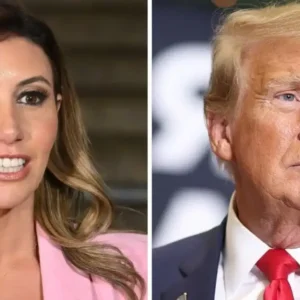In a time characterized by intense political division and ongoing drama, Alina Habba, Counselor to President Donald Trump, has emerged as a key defender of the administration’s policies. In a recent interview on Fox News’ “America Reports,” Habba robustly defended the Trump administration’s initiatives, particularly the establishment of the Department of Government Efficiency (DOGE). She criticized Democrats for what she views as their ongoing efforts to obstruct President Trump’s agenda, igniting significant discussion among political analysts and supporters.
As President Trump approaches the end of his first month back in office, the pressure to make impactful decisions during his initial 100 days is evident. Habba’s comments provide insight into the administration’s strategy to tackle what she describes as excessive government spending and bureaucratic inefficiency. Her direct and assertive style not only reinforces the America First philosophy but also indicates a shift towards governance that prioritizes accountability and waste reduction.
This article explores the key elements of Habba’s interview, including her responses to criticisms from Senate Minority Leader Chuck Schumer and Chicago Mayor Brandon Johnson. We analyze her defense of DOGE and its role in implementing spending cuts, her commentary on the previous administration’s financial decisions, and the broader implications of these political confrontations for American governance. Additionally, we examine the dynamics of partisan rhetoric and what Habba’s statements suggest about the future of Trump’s second term.
The context of Habba’s interview is significant, occurring during a tumultuous period in American politics. With Trump back in the White House, every statement is under scrutiny, and the administration’s initiatives, such as DOGE, aim to highlight and eliminate wasteful spending. This initiative seeks to redirect funds into American industries, marking a clear departure from previous policies.
In this politically charged atmosphere, expectations for administration members are high. Habba, a key legal advisor, has become a vocal advocate for the new agenda. Her interview, hosted by John Roberts and Sandra Smith, follows a series of contentious exchanges in Congress, making her comments particularly impactful for both the Trump administration and the broader political landscape.
A central focus of the Trump administration is DOGE, which is dedicated to identifying and eliminating wasteful government expenditures. Habba asserts that DOGE has already achieved significant savings by cutting unnecessary costs and reallocating funds toward strategic investments. She argues that the administration’s actions are a necessary response to what she views as the previous administration’s frivolous spending, particularly on initiatives that do not align with the America First agenda.
During the interview, Habba confronted criticisms from Schumer, who labeled the administration’s spending cuts as “lawless” and “dangerous.” In her rebuttal, Habba emphasized the legitimacy of the current administration’s legal standing and highlighted the successes of DOGE in achieving substantial savings. She criticized the previous administration’s spending priorities, framing them as extravagant and misaligned with taxpayer interests.
The discussion shifted when Mayor Johnson accused the Trump administration of lacking an understanding of the American public’s needs. Habba countered by asserting that the mandate for the administration’s policies comes directly from the American people, who voted for Trump’s America First agenda. This assertion positions the administration as a representative of voter preferences, dismissing the left-wing narrative as predictable and irrelevant.
As the interview concluded, Habba expressed enthusiasm for the White House team and the hard work being done to address past issues. She emphasized the commitment to action and accountability, reinforcing the narrative that the current leadership is focused on a comprehensive overhaul of federal policies.
Habba’s remarks are emblematic of the broader America First agenda, which seeks to reassert American sovereignty and redirect resources toward domestic priorities. While her defense of spending cuts resonates with many supporters, critics argue that such measures may overlook the complexities of governing a diverse nation. The ongoing debate over fiscal responsibility and government efficiency reflects a significant divide in American political culture.
In summary, Alina Habba’s recent interview serves as a microcosm of the current political climate, highlighting the tensions between accountability and partisanship. As the Trump administration continues to navigate these challenges, the implications for American governance and public trust remain profound. The pursuit of a government that operates efficiently and transparently is a goal that resonates with many citizens, and the outcomes of these debates will shape the future of U.S. politics.
